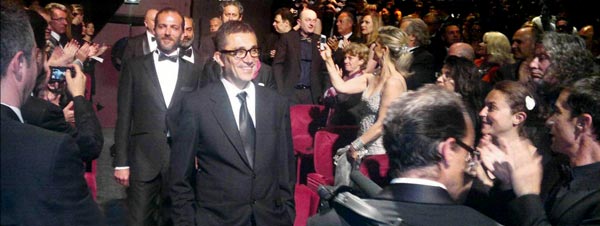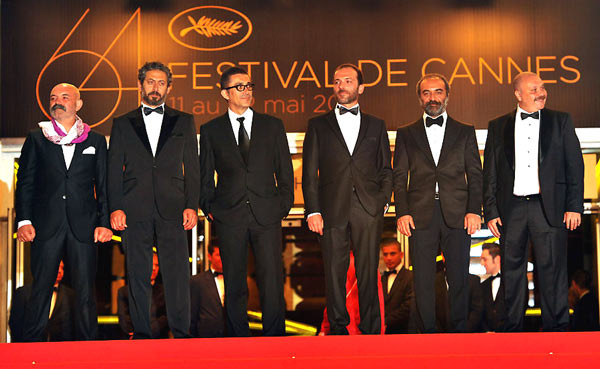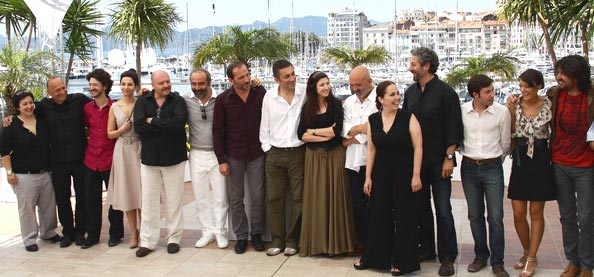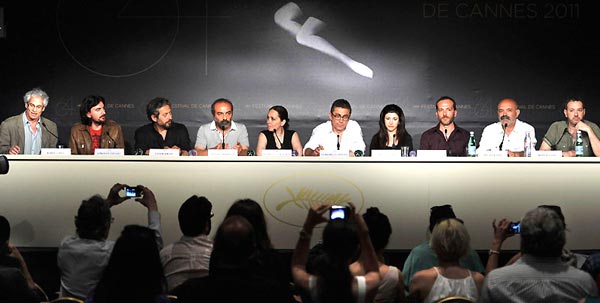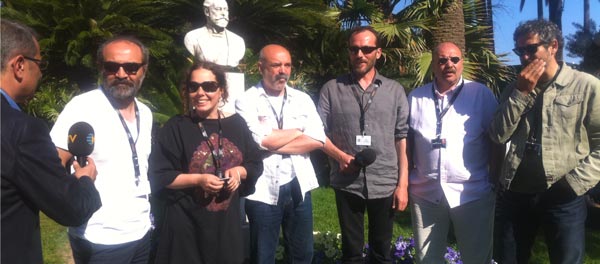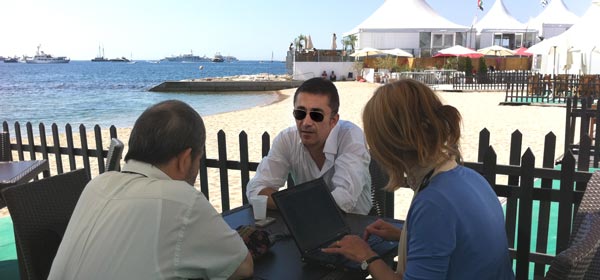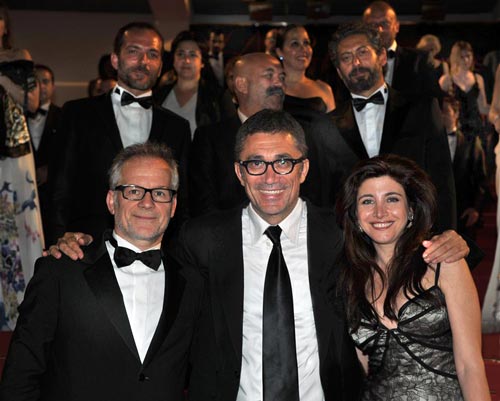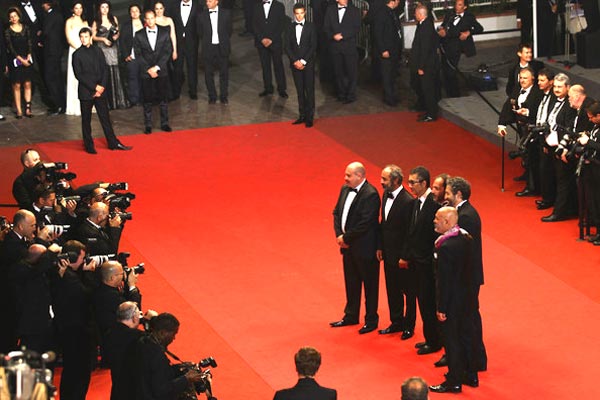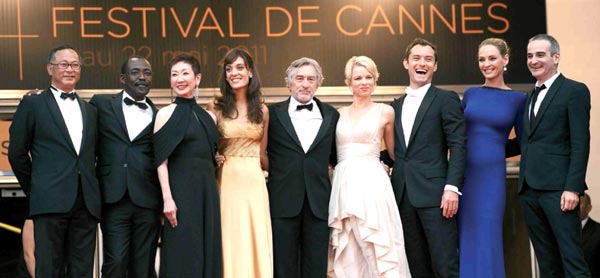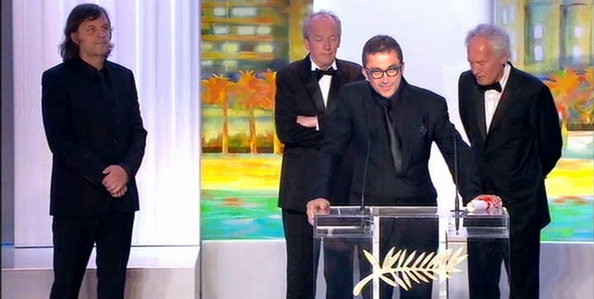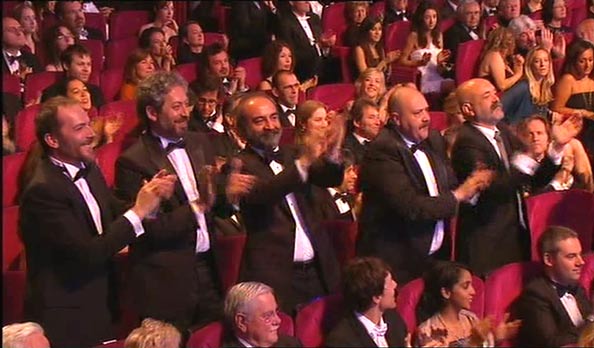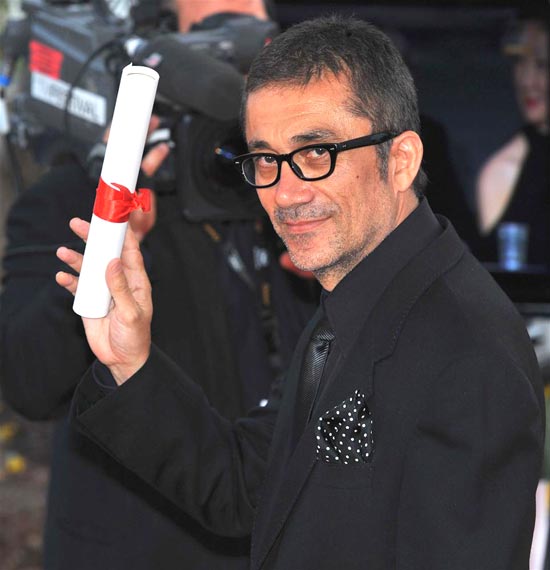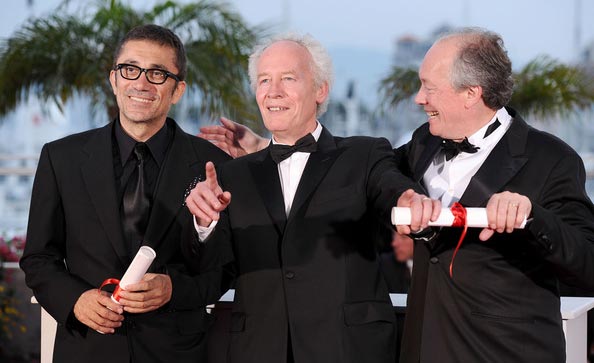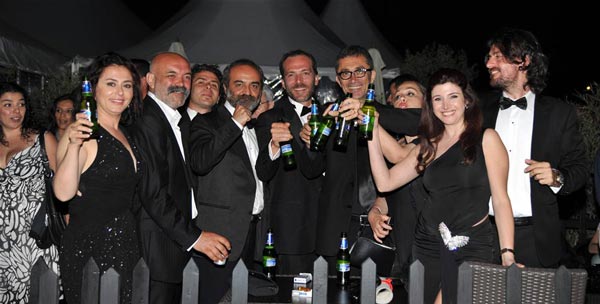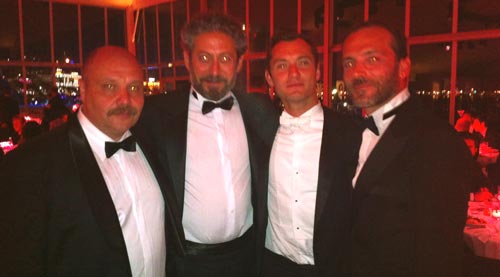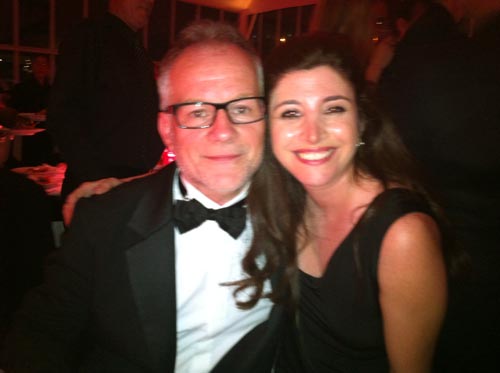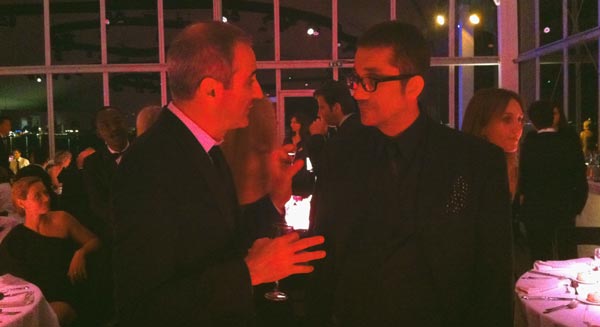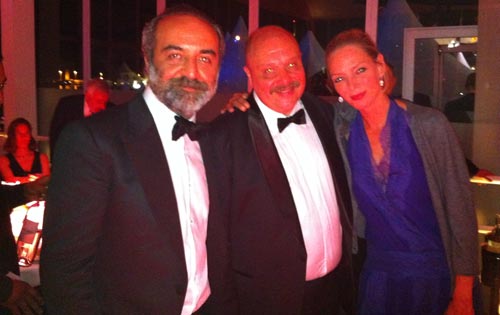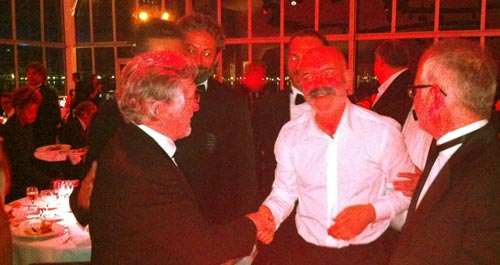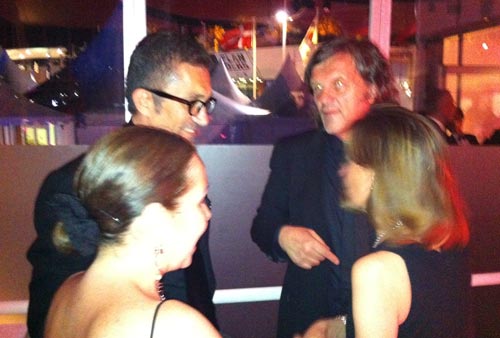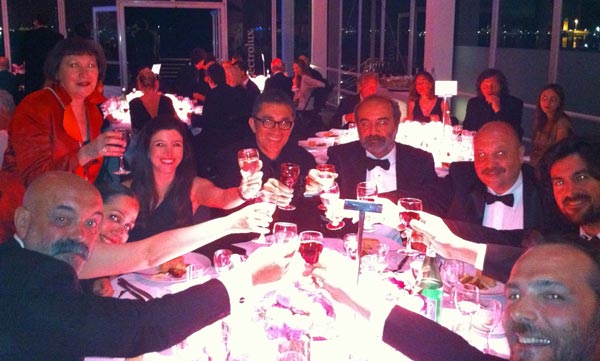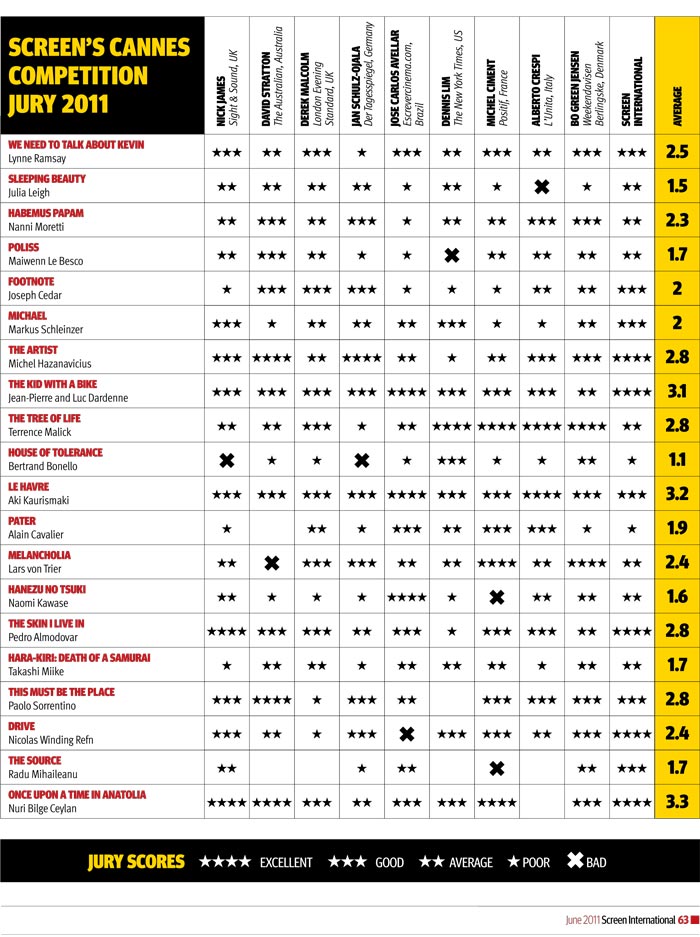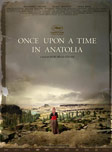
|
-- "Death of a Samurai", by Takashi Miike (Japan) Press during the festival : On Friday, the 64th Cannes Film Festival presented a film that grabbed critics and could nab the Palme d'Or on Sunday if the jury rises to the occasion. Both beautiful and beautifully observed, with a delicate touch and flashes of humor and horror, "Once Upon a Time in Anatolia," from the Turkish director Nuri Bilge Ceylan, is an ambitious, leisurely inquiry into a specific world — the haunting land of its title — that transcends borders. Touching on life, death and everything in between in 157 minutes, this metaphysical road movie follows a police investigation that, when the story opens, has led its characters into near dark.(...) "Anatolia" is an obvious contender for the Palme, which in recent years has often gone to a selection that plays in the final stretch. That doesn't mean the fix is in, only that the programmers seem to backload potential favorites.(...) (...)Ceylan is a sly and daring screen artist of the highest order and should draw wild praise with this new film for challenging both himself and us, the audience, with this lengthy, rigorous and masterly portrait of a night and day in the life of a murder investigation on his country's Anatolian steppes.
'Once Upon A Time In Anatolia' is a crime movie, but not as you know it, and as well as asking us to puzzle together fragments of a murder case, it also offers rich, and sometimes comic, ruminations on city, small-town and village attitudes, on cynical versus more feeling attitudes to life, on our ability to separate the personal and the professional and on the banalities that arises even in extreme, unusual situations. It might be about a murder, but it's also about the passing of time (and, in a subtly different way, passing the time), and to stress both, Ceylan asks that we share nearly three hours with him and his film.(...)
(...)After the intense dramatic exertions of "Three Monkeys," Ceylan seems to have deliberately moved into less accessible, more oblique territory. The drama unfolding just offscreen is, in fact, as rife with deception, betrayal and violence as that of "Monkeys," but this time the helmer seems to be observing it all from a mournful side angle. Yet despite or perhaps due to its relative lack of incident, "Anatolia" feels like the more mature work, suffused with a wry, tolerant humanity that finds its chief expression in the strong, character-rich performances. As aimless as the men's wanderings feel, there turns out to be nothing arbitrary about the carefully chosen timeframe. From first moment to last, this is a story overshadowed by death, allowing its characters the space in which to reflect on their lives.
Saying this is not everyone's cup of tea, barely begins to describe the uphill battle that will be required in order to market what may arguably be one of the most impressive but also most complex entries this year in Cannes.(...) A slow-burn study of investigatory obsession and police bureaucracy, Nuri Bilge Ceylan's mesmerizing "Once Upon a Time in Anatolia" plays like "Zodiac" meets "Police, Adjective." That's a tough combination to pull off: Neither David Fincher's epic tale of the infamous decade-spanning serial killer hunt nor Romanian director Corneliu Porumboiu's minimalist cop drama come with easy answers. But Ceylan has made a similarly analytical brain teaser, rendered in patient and sharply philosophical terms.(...) I would have chosen this as the best film of the festival. This is an observational 160 minute film about a group of cops, prosecutors and doctors looking for a body in the Anatolian countryside at night. More or less what you see are these five or six guys going through the night, you learn about their personalities, you watch them stop in a village, you see them bicker, you see them make jokes, you see them give their philosophy of life. In lots of ways, it's procedural in a way of something like The Wire, where you're watching people in action but the characters all gradually reveal themselves to be incredibly vivid. By the end of the film, you have a portrait of the Anatolia region in Turkey where you can't ever tell what's really true. By the end of the movie, you've been told what you think is the truth but there are so many things wrong with how it's been presented, that you're not sure it's really true.
In the last decade, the Turkish cinema has basked in the light of filmmaker Nuri Bilge Ceylan. With Once Upon a Time in Anatolia, the writer-director confirms his stature in a long, slow, hypnotic film that explores the human condition through side glances and offhand remarks, caring very little about time, especially the viewer's time, in eventless sequences without conventional action.(...) Nuri Bilge Ceylan has become a name synonymous with the more traditional type of auteur that the Cannes film festival reveres. In his sixth film and also his longest to date (also the longest film playing in competition) Once Upon a Time in Anatolia is a morality tale that reflects the state of mind of the Turkish people. Known for long, steady shots that reveal mystery and beauty similar to the styles of Abbas Kiarostami, even Andrei Tarkovsky, Ceylan has mastered his unique style of Turkish cinema that evokes philosophical questions about life. And while he seemed to have perfected his method with his previous films Uzak and Climates, Ceylan takes a different turn with his latest film. Combining the mystery of a dead body buried in the hills of Anatolia with the spark of an existential journey for its protagonist, the drama mirrors issues the country faces today.(...) The Cannes Film Festival closes tonight, and it has been an especially strong year. Even so, it's taken till this final weekend for critics to start muttering the M-word – "masterpiece". The longest, and arguably the slowest, film in the competition, the Turkish entry Once Upon a Time in Anatolia, is also the most substantial offering here, and a definite front-runner for the Palme d'Or.
(...)If I were in charge, I think I'd give the prize to Turkish director Nuri Bilge Ceylan's late-screening Once Upon a Time in Anatolia, a hypnotic countryside police procedural I thought was a masterpiece for about an hour and a half, only to be let down by a derivative final hour. Still, 90 minutes of visionary filmmaking—a portrait of the rituals, futility and despair of solving a murder case—are way more than most of this year's films offered.(...) The last Friday evening competition slot in Cannes is a difficult one for journalists, nearly all of whom are in a state of utter exhaustion. But it's thought to be a canny slot from which to influence the jury, who (presumably) are much better rested and in a state of excitement and anticipation about the closing weekend.
Programming a 156-minute slow-burner like Once Upon a Time in Anatolia, from the typically glacially-slow Turkish director Nuri Bilge Ceylan at the end of the festival is like an exercise in cinematic sadism by the Cannes festival programmers. The film had some walk-outs, but Bilge's film is something special. A forensic procedural that plays like a Russian novel within a 12-hour period, filled with revelations, thoughts on adultery and the hope for the future through children. For the first hour-and-a-half of its running time, eveything takes place at night (featuring stunning images captured from car lights and later, lanterns). A convoy of cars, populated by a young doctor named Cemal (Muhammet Uzener), a public prosecutor, a police chief and couple of other cops, along with a pair of confessed murderers, drive around the Anatolian countryside trying to locate where the victim is buried. Eventually, the corpse is located and an autopsy takes place at a local morgue, and along the way, we learn a lot about adultery, the hope for children and the vast spaces that separate people who work side by side.(...)
(...)Frankly it's unfair to position such a challenging film as the penultimate film in competition. At the press screening on Friday night, one audience member drew a big laugh applauding when it was announced on screen that the body had - finally - been found.
But Ceylan's achievement is considerable, and his cocktail of sadness in the film, embodied particularly in the mournful eyes of the doctor (played by Muhammet Uzuner) packs a powerful punch. Ceylan merely hints at what has happened in the past and never hammers anything home. The reasons for the murder are not elucidated in much detail, likewise the reasons for the melancholy that plagues the doctor and the prosecutor. All we know is that the interaction between men and women is the motive for much of the conflict beneath the surface of this ambitious movie. Once Upon a time in Anatolia, the longest, most demanding film of the official selection. Nuri Bilge Ceylan's previous movie was the very accessible, entertaining drama Three Monkeys, but this time around, he returned to his previous style: quiet, bleak, without giving much information. A group of men are driving through the country, looking for a corpse after the murderer has confessed the crime. They can't find the body and while searching, they engage in what appears to be random chatter. They find the body after 90 minutes, and by this point the audience realizes that most of that apparently pointless talk has major significance, not in the crime itself, but in the different lives of all the men involved in the procedure. This is not an easy film, but if watched in the right frame of mind, it is an extraordinary meditation of being a man and a fascinating (if ultra slow) police procedural. Turkish writer and director Nuri Bilge Ceylan delivers another stunning film with this existential thriller. A group of law enforcement officers take a criminal to a remote area to locate the body of the victim. Ceylan's assured vision digs beyond the surface of the ordinary police procedure to expose the humanity of its characters. His films are acquired taste but extremely rewarding for those looking for cinema beyond entertainment that addresses the human condition. The talented cast and crew includes Muhammet Uzuner, Yilmaz Erdogan, Taner Birsel as the doctor, detective and prosecutor. Gökhan Tiryaki's cinematography is perfectly in tune with Ceylan's vision. (...)So the climax to the contest came in the form of a search for the Truth: namely, a murder investigation, in Once Upon a Time in Anatolia. Of course, it being a film by Nuri Bilge Ceylan, the search ends on a note of skeptical uncertainly – wholly fitting for a competition that included an unusually large number of good or very good films, no outright turkeys, and few real surprises.
In short, as I write, anything could win – and I've been to Cannes often enough not to venture overly bold predictions; one never knows what the jurors will like, still less how they'll negotiate with one another (wouldn't you love to be able to listen in on Robert De Niro and Mahamet-Saleh Haroun arguing the toss?).
But I can at least proffer my own best-of-the-fest list; they are more or less in order of preference, and the first is the one I'd most like to see win the Palme d'Or:
-Once Upon a Time in Anatolia (Ceylan)
-Footnote (Joseph Cedar)
-The Kid with a Bike (Jean-Pierre and Luc Dardenne)
-Le Havre (Aki Kaurismäki)
-The Artist (Michel Hazanavicius)
-The Skin That I Live In (Pedro Almodóvar)
-This Must Be the Place (Sorrentino)
-The Tree of Life (Terrence Malick) As I write this, it's early morning on Cannes prize day. For me the rapture has already happened – it was being at this festival in a glorious year. Now, as I'm back at home in London falling asleep, waking and falling asleep again, the one omnipresent thought I have is that it will be a huge injustice today if Terrence Malick's The Tree of Life (pictured) doesn't win the Palme d'Or. I say this not because I think it was the 'best film' – this hymn-like celebration of creation and destruction seems almost allergic to drama as you watch it – but because it was so overwhelmingly the event of the festival.(...) This almost painfully slow crime procedural from lauded Turkish director Nuri Bilge Ceylan may have been too long for many critics tastes, and indeed at 157 minutes will be a real bum-number for any audience member, but was so delicately put together in terms of performance, direction and - most strikingly - its screenplay that we feel it can't possibly be ignored tomorrow night. Ostensibly the story of the hunt for a corpse, its opening act goes on for almost 90 minutes as two convicts lead three car loads of police plus a doctor, a prosecutor and a couple of soldiers on a merry dance from isolated hill-top to isolated hill-top in search of the spot where they buried the body.
Le premier plan est celui d'une vitre sale, filmée du dehors, derrière laquelle devisent des adultes. Dans le dernier, un homme observe un petit garçon de l'intérieur d'un hôpital. Que s'est-il passé entre ces deux images, montées comme l'entrée et la sortie d'un tunnel, prologue funeste et final d'espoir ? Le déroulement de l'un des grands films de ce Festival de Cannes, 2 h 37 magistrales, au cours desquelles ce poète ténébreux qu'est le Turc Nuri Bilge Ceylan illustre ce que veut dire faire du cinéma : sonder la faiblesse des hommes et leurs désirs, évoquer ce qui transparaît d'âme dans leurs silences et ce que leurs obsessions traduisent de soucis quotidiens, communiquer des sensations, coller au temps qui passe, brouiller les notions de documentaire et de fiction.
Avec Il était une fois en Anatolie, l'auteur turc Nuri Bilge Ceylan, triplement primé en 2003 avec Uzak, a clos samedi la compétition cannoise par un road-movie nocturne au charme hypnotique. Du grand cinéma, encore. Deux films qui ont en commun de se présenter comme des contes orientaux, avec des fortunes diverses. Le grand réalisateur turc Nuri Bilge Ceylan prouve une fois encore avec IL ETAIT UNE FOIS EN ANATOLIE qu'il est un immense cinéaste. On pense d'ailleurs beaucoup au réalisateur iranien dans ce film, qui nous emmène pendant 2h30 sur les routes et dans les villages de l'Anatolie, cette région centrale de la Turquie composée de steppes désolées et monotones. On y suit les tribulations d'un procureur, un médecin légiste, une escouade de policiers et deux prisonniers à la recherche du cadavre que ces derniers ont enterré. Sauf que, loin du polar, le film s'intéresse aux à-côtés, ce qui se dit pendant les trajets, pendant les pauses, tous ces moments faibles d'ordinaire évacués au nom de l'efficacité narrative. Et c'est passionnant ! Car si le film est long et lent, il mérite qu'on s'y embarque, ne serait-ce que pour son scénario d'une ampleur romanesque inouïe, même s'il se déroule sur moins de vingt-quatre heures, et qui amène le spectateur à une émotion aussi intense qu'inattendue. Le tout superbement photographié et mis en scène, mais ça, on en a pris l'habitude avec Nuri Bilge Ceylan.
L'auteur de 'Uzak' et des 'Climats' nous livre son film le plus étrange et peut-être le plus fascinant.(...) Un film long (2h37), très lent (presque en temps réel), avec des personnages assez frustres mais qui vont révéler petit à petit leur humanité. Si bien que ce conte réaliste au cœur de la campagne en Anatolie n’est jamais ennuyeux. Ce film superbement mis en scène souffre malgré tout d’être très mal programmé: c’est le tout dernier de la compétition. C’est pourtant un film marquant, qui se serait bonifié au fil des jours s’il avait été projeté avant. Pari audacieux de la part d'un des grands habitués de la compétition, le réalisateur turc Nuri Bilge Ceylan. Il était une fois en Anatolie (titre ironique) relate une enquête policière rurale dans tous ses pénibles détails, quasiment en temps réel. Un homme a été tué, l'assassin est prisonnier, et l'on recherche le cadavre dans la nuit. On le découvrira, le ramènera à la morgue, puis pratiquera une autopsie pour comprendre comment il a été tué. Mais le médecin ne dira pas toute la vérité.
(...)Si les tunnels de dialogue peuvent lasser – surtout dans la première partie du métrage -, impossible de ne pas être béat d'admiration devant la puissance sensorielle de certains plans – un train qui passe au loin, un éclair qui révèle un visage sur une pierre, une pomme qui suit le fil de l'eau, la jeune fille à la lanterne. Déjà primé pour sa mise en scène en 2008 pour «Les trois singes», Nuri Bilge Ceylan confirme qu'il est bien l'un des plus grands stylistes du cinéma contemporain. Le propos reste néanmoins des plus abscons. S'il capte l'inquiétude et l'absurdité du monde et met en scène une Turquie plurielle des steppes au bloc opératoire, il ne donne aucune clé pour comprendre la finalité de l'œuvre ou la psychologie de son personnage principal. ...Cette errance à la lumière des phares à travers les collines anatoliennes est en soi un grand moment de cinéma.
La seconde partie est l'hallucinante séance d'autopsie du cadavre enfin découvert. En réalité, cette dernière n'est que la métaphore de l'autopsie à laquelle se livre le réalisateur depuis le début sur une région, une société et quelques couples (même si à l'écran on voit surtout des hommes).
Nous avions abordé les 2 heures 37 minutes de ce dernier film de la compétition avec circonspection. Nous en sommes ressortis enchantés. Enchantés par la leçon de cinéma, mais aussi et peut-être surtout par ce morceau d'humanité où nous avons appris avec le bon docteur Cemal que toute vérité n'est pas bonne à dire.
Il était une fois en Anatolie, le cinéaste turc Nuri Bilge Ceylan confronte son récit policier au temps qui passe et aux paysages arides d'Anatolie. Long, contemplatif, mais sublime.(...)
(...)Anadolu'nun bağrında yaşanan yaman bir gece bu... Başını bölge savcısı, görevli doktor, öfkeli bir komiser ve katil kardeşlerin çektiği grup, orada yalnızca 'domuzbağı' ile bağlanıp gömülmüş zavallı bir insanı değil, bu ülkenin kimi insan gerçeklerini de arıyorlar. Ama bu, aynı zamanda evrensel insan gerçekliğine doğru bir yolculuğa ulaşıyor. İnsanı insan yapan birçok şeyin, bir gece boyunca usul usul örülerek bir büyük tabloya dönüşmesi olayı.(...) (...)64. Cannes Festivali'nde önceki gün gösterilen iki filmin ardından gözler jüriye çevrildi. Bu gece Palmiyeler sahiplerini bulacak. Öncelikle şunu söylemeliyim, uzun yıllardır ilk kez tahmin yürütmek bu kadar zor. Bunun nedeni, yarışma programına seçilen filmlerin düzeyinin oldukça yüksek olması. Bütün filmleri izledikten sonra, ödül listesine girebilecek en az 7-8 film üzerinde konuşuyoruz. Oysa, geçen yıllarda en çok 3 filmin adı geçerdi tahmin listelerinde.
Günlerdir Nuri Bilge Ceylan'ın "Bir Zamanlar Anadolu'da" filmini heyecanla bekledik. Ceylan'ın Cannes'a seçilen dördüncü filmine girerken, içimizde hep aynı soru: "acaba bu sefer de tutturabilmiş mi?". Hani kardeşinizin piyesine gidersiniz, sahneye çıkmadan önce içinizde bir huzursuzluk, "ya iyi olmamışsa?" tedirginliği... Ceylan'ın filmleri öncesi hissettiklerimiz aynen bu örneğe benziyor. Ama her seferinde bir kez daha şaşırtıp, sevindiriyor bizi. "Bir Zamanlar Anadolu'da" Ceylan'ın belki de en farklı filmi. Öncelikle hemen belirtelim, alıştığımız uzun sessizliklerin yerini, doğallığı parmak ısırtacak diyaloglar almış. Evet, film biraz uzun (2 saat 37 dakika) ama biz nefesimizi tutarak ve gözümüzü kırpmadan izledik. Benzer duyguyu en son "başeser" nitelediğimiz Haneke'nin "Beyaz Kurdele"sinde hissetmiştik. Eşi Ebru Ceylan ve baş "ortağı" Ercan Kesal'la birlikte yazdıkları senaryo öylesine başarılı ki, polis komiserini canlandıran Yılmaz Erdoğan, Cumhuriyet savcısını Taner Birsel ve Doktor Cemal'i oynayan Muhammet Uzuner gerçek yaşamlarından kopup ekrana yerleşmiş gibiler. Ceylan'ın günümüzün en iyi yönetmenlerinden oyuncularından çıkarttığı performans ve sahnelerin ve görüntünün ardarda büyüleyici şekilde sıralanmasıyla bir kez daha ispat ediyor. Ceylan gerçekten bir görüntü sihirbazı ve bu hüneri aklıyla birleşince karşımıza böylesi büyük filmler çıkıyor. Filmde birçok insan hikâyesi örtüşüyor. Doktorun yalnızlığı ve pragmatik görünümünün ardındaki duygusallık, savcının karısını hiç tanımadığını anlamasıyla içine düştüğü suçluluk çukuru, polis komiserinin iş ve aile içi çıkmazları ön planda yer alan öyküler. Aslında sinema izleyicilerine en itici gelecek ögeleri birleştiren ana konu, bir gece yarısı iki katil zanlısının polis, savcı, adli tıp doktoru, jandarma temsilcileriyle birlikte olay yeri araştırması yapılması. Ceylan devlet denen girift ve acımasız "makineyi" öylesine güzel çizmiş ki, "film noir" türünün belki de en başarılı örneklerinden birini çıkartmış. Cinayet mahalinin belirlenmesi sahnesi gece çekilmiş ve bir buçuk saat sürüyor. "Şehirli-taşralı" ayrımını komplekssiz ve dürüstçe yerleştiren Ceylan'ın filminin bizce yabancı izleyici ve eleştirmenler için en zor tarafı, konuşmaların, içeriğin belki de Ceylan sinemasında ilk kez bu denli Türkiyeli ögelerle bezenmiş olması (bu nedenle belki Türkiye'de en iyi iş yapan Ceylan filmi olabilir?). Bu nedenle de bizleri iki buçuk saat boyunca tatlı/acı güldüren filmin her ayrıntısını basın gösterimindeki diğer sinema yazarları bizim kadar anlamamış olabilirler.(...) Ve geldik son iki filme. Deyim yerindeyse, İngilizce ve Fransızcadan dilimize serbest uyarlayabileceğimiz mahur güne. Cuma ve Cumartesi G Günüydü bizler için. Nihayet Nuri Bilge Ceylan'ın Bir Zamanlar Anadolu'da'sını görebilecektik.(...) Dünya markası Nuri Bilge Ceylan'ın her filminin Cannes'da bir olay olduğu artık bilinen bir gerçek. Tüm meslek erbabı neredeyse bizim heyecanımızla Bir Zamanlar Anadolu'da'yı bekliyordu. Orta Anadolu'nun küçük bir kentinde işlenen cinayetin yer tespiti için katil eşliğinde üç arabalı (savcı, doktor, polis ve jandarma) bir ekip sabaha kadar maktulün gömüldüğü yeri ararlar. Ancak iş cesedi bulmakla bitmemektedir. Katil, komiser, doktor ve savcı etrafında yaratılan "mikrokozmoz/küçük evren" yalnızca o insanların ailesi, yakınları ve sevdikleriyle sınırlı değildi. Ceylan ilk kez bu denli incelik ve derinlikle kendi "yalnız ve güzel" toplumundan bir kesit yansıtıyordu. Başta Taner Birsel, Muhammet Uzuner, Yılmaz Erdoğan, Ahmet Mümtaz Taylan, Fırat Tanış ve Ersan Kesal olmak üzere bütün oyuncular (hele hele otopsi yapan memur) tek kelimeyle "olağanüstü bir performans" sergiliyorlardı.
Salondan çıkar çıkmaz 10 kadar Fransız, Arap, İsrailli, Kanadalı meslektaşımızın görüşüne başvurduk. Arap ve İsrailli arkadaşlar filmi "başeser" nitelediler. NB Ceylan'ın "en diyaloglu, konuşmalı" senaryosu nitelediğimiz eserin çok yetersiz (bir anlamda imkânsız) çevirisine rağmen Doğulu duyarlılıklarından ötürü büyük oranda ayrıntıları yakalamışlardı. Batılı arkadaşlarımızsa nüansları kaçırmanın da verdiği bir tatminsizlikle film içindeki bazı hikâyelerin yarım veya boşlukta kaldığını, senaryodan iki film çıkabileceğini, filmin özellikle ilk 30-40 dakikalık kısmını biraz uzun bulduklarını, ancak Fransızca deyişiyle NBC imzasının tüm özgünlüğünü ve yaratıcılığını koruduğunun altını çizdiler. Herkes filmin sanatçının, toplumsal boyutu en zengin filmi olduğu, fakat estetik ve teknik ilke tavırlarından hiç taviz vermediğini kaydettiler. NBC'nin arayan, araştıran kişiliğini, isteyerek veya istemeyerek yeni bir stil denediğini kaydettiler. Şimdi sıra jüride… Bakalım son Ceylan eserinin mesajını ne kadar yakalayacak ve paylaşacaklar?
(...)The Dardennes shared the festival's Grand Prix (its second prize) with Turkish director Nuri Bilge Ceylan for his sixth film, 'Once Upon a Time in Anatolia'. The title hints at a new interest in storytelling and words for Ceylan after the often-silent observations of his previous films. But this portrait of a night and day in the life of a murder investigation in rural Turkey is crafty, rigorous filmmaking that demands we keep our eyes and ears open. Slowly its ensemble approach narrows our interest to one or two characters whose lives are illuminated by the job in hand. There's horror and comedy alongside staggering imagery. Ceylan invites us along for a long ride, and if we're up for it, it's rewarding. It was the best film in a competition of so many strong films.(...) It wouldn't have been my choice, but I can't really argue with the Cannes jury's decision to award the Palme d'Or to Terrence Malick's The Tree of Life. I found its overarching cosmic aspirations indigestible – the film felt like an attempt to refit the Sublime for the IMAX era – but Malick was undeniably determined to challenge narrative cinema's traditional limitations.
(...)It was great to see an award for the Turkish director Nuri Bilge Ceylan's stunning, disturbing Once Upon a Time in Anatolia, his beautifully photographed crime drama about police and prosecutors grimly locating a buried body through one long night. As the corpse is exhumed, many long-buried thoughts and fears are disinterred in the minds of the hard-bitten lawmen.
It is a brilliant, masterly film with a distinctive force and artistic gravitas. This, too, could quite easily have won the Palme D'Or: I think it is Ceylan's best yet.(...)
Once Upon a Time in Anatolia, directed by Nuri Bilge Ceylan — "I would have chosen [this] as the best film of the festival. ... This is an observational 160 minute film about a group of cops, prosecutors and doctors looking for a body in the Anatolian countryside at night. More or less what you see are these five or six guys going through the night, you learn about their personalities, you watch them stop in a village, you see them bicker, you see them make jokes, you see them give their philosophy of life. In lots of ways, it's procedural in a way of something like The Wire, where you're watching people in action but the characters all gradually reveal themselves to be incredibly vivid. ... By the end of the film, you have a portrait of the Anatolia region in Turkey where you can't ever tell what's really true. By the end of the movie, you've been told what you think is the truth but there are so many things wrong with how it's been presented, that you're not sure it's really true." (...)Along with other works honoured the other day, Le Gamin Au Vélo by the Dardenne brothers and Nuri Bilge Ceylan's Once Upon A Time In Anatolia (an almost platonically perfect Cannes title), it asserts the dignity of cinema against the vulgarities of the movies.
Cannes, it should never be forgotten, is a resistance movement. It might be a marketplace itself, a place where deals are done and contracts signed. But it is also the headquarters of a rebel alliance, dedicated to the idea that films should be difficult, inexplicable, overreaching and occasionally trying to the patience.(...)
A trio of yellow car headlights wind through the dark, shadowy steppes in the gorgeous opening shot of Nuri Bilge Ceylan's Once Upon A Time in Anatolia. When they come to stop at a well, a cadre of bumbling police officers pile out in the dim light, Keystone Cops as they might have been painted by an old master. When a handcuffed vulpine prisoner determines that this isn't the location they're looking for–the right place is marked by a "round" tree–they pile back into the cars and try another spot, and then another. When they eventually find the location they so arduously seek, the site of a grisly burial becomes a revelation. The film's widescreen compositions are simultaneously restrained and arresting, and it's easy to get lost in their stark beauty. Ceylan's leisurely, grim police procedural was slotted on the last day of the festival, so that Cannes attendees who wanted a chance to see the much-anticipated feature were obliged to stay until the very end. Over at least one dinner table that night, however, this Turkish delight, with its muted palette and complicated vision of fairness, was declared the film of the festival. In Anatolia, as in many of the most intriguing films at this year's Cannes Film Festival, justice was in the eyes of the beholders. The festival's second prize, the Grand Prix, was split between two films, 'The Kid With a Bike' by Jean-Pierre and Luc Dardenne and 'Once Upon A Time in Anatolia' by Nuri Bilge Ceylan. The first is a typically economic and wise fable about a troubled young child in working-class Belgium. The second is an epic and rigorous sideways portrait of a night and day in a murder investigation. 'Once Upon a Time in Anatolia' takes the films of Ceylan somewhere new. For me, it was the only masterpiece in the Cannes competition – and that's in a year of very strong films all round... Palme d'Or
Winner: 'The Tree of Life' (Terrence Malick).
Should have won: 'Once Upon A Time in Anatolia' (Nuri Bilge Ceylan)
The last day screening of Nuri Bilge Ceylan's ruminative, challenging Once Upon a Time in Anatolia strengthened an exceptionally ambitious and coherent competition at this year's Cannes Film Festival.(...) Once Upon a Time in Anatolia has Turkey's finest filmmaker rebounding from the arty mediocrity of his previous Three Monkeys (2006) to confirm his international status with an impressive, bleakly comic epistemological treatment of a police investigation conducted in the dark emptiness of the Anatolian night.(...) Anatolia included my favorite shot of the festival: An apple falls from a tree, rolls down a hill, plops into a stream and is carried off by the current, until it's not. Two films from previously lauded Cannes auteurs split the Grand Prix citation: The gorgeous, novelistic "Once Upon a Time in Anatolia" from Turkish director Nuri Bilge Ceylan, and "The Kid With a Bike," from the Belgian filmmakers and brothers Jean-Pierre and Luc Dardenne. These were two critical favorites. (...) I was particularly pleased to see Nuri Bilge Ceylan's Once Upon a Time in Anatolia share the Grand Prix. The film arrived late and duly confirmed that the Turkish director has one of the most singular voices in world cinema.
Nuri Bilge Ceylan's Once Upon a Time in Anatolia leaves a lot unsaid, literally. For most of the film, which is more than two and a half hours long, a prosecutor, doctor, suspects, and cops are driving around in rural Anatolia, all looking for a corpse. We follow them in a car, from one hill to another, to yet another false burial site, always seated the same order in the car, with the suspects in the back and the prosecutor, Nusret (Taner Birsel), in charge. The film, co-winner of this year's Grand Prix at Cannes, effectively conveys the monotonous search, the uniform Anatolian landscape, and the interminable journey.
(...) I have slightly more mixed feelings about the Grand Prix (or second prize), which was shared between the Dardennes' typically fine (but somewhat familiar) The Kid With a Bike and Nuri Bilge Ceylan's epic butt-number Once Upon a Time in Anatolia. The latter is an intelligent, meticulous, incredibly beautiful movie that's offered plenty of food for thought since I saw it, but that I found downright torturous to actually sit through. Mostly, that's because Ceylan is playing a deliberate, formalist game of keep-away, introducing what looks on the surface like an exciting narrative—the film opens at night, with a bunch of cops and other officials toting two criminals around gorgeously barren landscapes in search of a corpse—only to slow the "action" to a crawl (it takes 90 minutes of this two-and-a-half hour movie just for them to find the body) and focus our attention on bureaucratic trivia and raw bits of the characters' psyches. Ceylan knows precisely what he's doing—a lengthy shot of an apple tumbling downhill into a stream, merely to come to rest beside other rotted apples, all but chides us for seeking direct answers—and he uses car headlights the way Kubrick used candles in Barry Lyndon, but I still had enormous trouble staying alert amidst the endless trudging and sniping and sharing of seemingly random anecdotes. But I saw it late at night, after more than a week spent gorging on cinema, so I don't really trust my negative reaction, and the jury's high esteem further suggests that I might want to take a second look in future. Once Upon a Time in Anatolia is the kind of film that thrives at Cannes. A long, slow-burning account of the search for a missing corpse, reports from the Croisette are that audiences broke into nervous laughter 90 minutes into the 150-minute film when they realized they'd just witnessed the movie's first plot point. Still, critics were won over by the Turkish film, which shared the festival's Grand Prix prize with The Kid With a Bike. The question remains whether Anatolia will be one of those Cannes hits that's too philosophical and obscure to gain traction, or if its festival success will launch a foreign awards campaign. (...)The runner-up Grand Jury prize was shared between Le Gamin au vélo and Once Upon a Time in Anatolia from Turkey's Nuri Bilge Ceylan. The second film was a brave choice. Did jury president Robert De Niro find a calling echo in the title, so like his and Sergio Leone's Once Upon a Time in America? Or did the jury recognise the dark purpose and clever design in a 2½-hour "police procedural" that ranges across a provincial landscape, laying open not just a murder but a society? (...)In an unusually bounteous year for quality films,
the jury's choice of two films to share the Grand
Prize was understandable. Nuri Bilge Ceylan's
Once Upon a Time in Anatolia spent most of its first
ninety minutes in the dark as three vehicles (two
police cars and a jeep) meandered along country
roads in search of a dead body. Mesmerizing
footage of headlights in long shot alternated with
the frustration of the confessed killer's inability
to locate the corpse. At each stop, seemingly
inconsequential banter between the prosecutor, the
police commissar and the doctor turn out to be
loaded with clues that pay off later on.
Cannes Film Festivali'nin ödül töreninde Robert De Niro, Grand Prix sahiplerinin 'Bir Zamanlar Anadolu'da' ve Dardenne Biraderler'in 'Le Gamin au Velo'su olduğunu duyurunca önce basının töreni izlediği Debussy salonunda Türkiyeli ekip arasında heyecan yaşandı, sonrasında da Türk standında verilen, 'Bir Zamanlar Anadolu'da ekibinin de katıldığı partide…
Film ekibinin alkışlarla karşılandığı, eğlenceli gecede sorularımızı yanıtlayan, filmin savcısı rolündeki Taner Birsel, "Sinema biraz deli işi, 67 gün -27 derecelere varan soğuklarda delice işler yapıyorsun. Sonra gidip smokinler içinde çok gösterişli salonlarda onurlandırılıyorsun. Bu tezat bile insanın duygularını oradan alıp bambaşka yerlere götürüyor" diyerek durumu özetledi. Daha önce Zeki Demirkubuz'un 'Belirli Bir Bakış' bölümünde gösterilen 'İtiraf'ıyla da Cannes'a gelen oyuncu "Soğukta donmuş ayak, kulaklarınla saatlerce beklediğin o bozkırda bu anı mesela düşünmüyorsun. Yaptığın yolculuk iki yıl sonra birden burada infilak ediyor" diyor ve 'Bir Zamanlar Anadolu'da'nın heyecanını "Filmin önemli bir parçası olduğumuz çok hissettirildi bize Nuri tarafından" diye açıklıyor: "Masterpiece denen bir filme katkıda bulunmak bana yetti. Ödül bunun üzerine bonus gibi geldi."(...) Nuri Bilge Ceylan'ın "Bir Zamanlar Anadolu'da" filminin aldığı Jüri Büyük Ödülü, gerek festival izleyicileri, gerekse eleştirmenlerin farklı tepkileriyle karşılaştı. Filmi, bir başyapıt olarak görenler, hatta Altın Palmiye'yi hak ettiğini düşünenler olduğu gibi, beklentileri karşılamayan bir film olduğunu savunanlar da var.
Dünkü Le Monde'da çıkan Jean-Luc Douin'in eleştirisi, filmi "büyük bir yapıt" olarak nitelendirerek, Dostoyevski'nin romanesk yoğunluğuna sahip olduğunu, farklı türleri (realist, trajik, komik) mükemmel bir senteze kavuşturduğunu söylüyor. Filmin, Raymond Depardon'un, Frederick Wiseman'ın belgesellerindeki polisiye öykülerin, Romen yönetmen Cristi Piu'nun İstanbul Film Festivali'nde de gösterilen "Dante Lazerescu'nun Ölümü"ndeki hastane sahnelerinin gerçekçiliğine sahip olduğunu belirten eleştirmen, Ceylan'ı Türklerin 'Simenon'u olarak nitelendirmekle kalmıyor, görüntülerin mükemmelliğini La Tour ve Vermeer'in tablolarıyla kıyaslıyor.(...) Procédé inverse, enfin, dans Il était une fois en Anatolie, plongée bavarde au sein des institutions de cette province turque reculée, qu'incarne une troupe saugrenue (procureur, commissaire, médecin, maire, sergent, suspect…) partis à la recherche d'un cadavre élusif. Lorsque, à la fin d'un repas ou d'une autopsie, le flot des conversations se tarit, le silence recouvre le film d'une beauté sibylline et insondable, laissant, par un poignant effet de contraste, le spectateur sans voix. (...)Il était une fois en Anatolie est la radicale et audacieuse réinvention d'un réalisateur. En effet, loin de l'univers « turc » de ses derniers films, Ceylan se rapproche beaucoup, dans le style, de réalisateurs comme Belà Tarr ou même Andrei Tarkovski. L'égarement, la dissimulation, l'hypocrisie, l'insondable question du « moi » ancré dans le temps et l'incompréhension de la mort : tels sont en partie les thèmes traités dans ce film qui va sonder toute la misère mais également tout le comique de l'existence humaine. A travers ces paysages anatoliens, lieu où se sont déjà égarés les esprits de nombreux artistes, le réalisateur nous propose une histoire minimaliste, abstraite et chronologiquement répartie sur seulement un jour et demi.
|
||||||||||||||||||||||||||||||||||||||||||||

